Table of Contents
Get started with MyPerfectResume today!
- Build a resume on any device
- Pick an ATS-friendly template
- Tailor with AI copy suggestions
Why this resume works
- Quantifies accomplishments: Measurable accomplishments, such as a 30% reduction in processing time, paint a clear picture of the applicant’s impact.
- Uses action-oriented language: Using action verbs such as “analyzed” and “developed,” the applicant highlights their initiative and effectiveness.
- Illustrates problem-solving ability: The implementation of bioinformatics pipelines, reducing errors by 30% showcases problem-solving skills through innovative solutions and critical thinking.
More Bioinformatics Analyst Resume Examples
Explore our bioinformatics analyst resume examples to effectively showcase data analysis, programming skills, and genomics expertise. These biology resume samples will help craft a standout resume tailored to your career aspirations in bioinformatics.
Entry-Level Bioinformatics Analyst
Why this resume works
- Effective use of keywords: Strategically using role-specific keywords like “genomic data analysis” and “pipeline development,” the applicant optimizes their resume for applicant tracking systems (ATS).
- Shows digital literacy: The applicant’s expertise in Python, R, and SQL reflects strong digital readiness for modern workplaces, echoing essential computer skills required today.
- Centers on academic background: Highlighting advanced degrees in the education section emphasizes a solid foundation in biotechnology early in the applicant’s career.
Mid-Level Bioinformatics Analyst
Why this resume works
- Points to measurable outcomes: By boosting data processing speed by 35%, the applicant showcases their knack for delivering measurable improvements in project outcomes, highlighting a focus on efficiency and effectiveness.
- Displays technical expertise: Mastery of programming languages like Python, R, and C++, alongside certifications, illustrates the applicant’s solid technical foundation essential for bioinformatics roles.
- Demonstrates language abilities: Language skills in Spanish, German, and French indicate the applicant’s ability to facilitate collaboration across diverse teams.
Experienced Bioinformatics Analyst
Why this resume works
- Showcases impressive accomplishments: By detailing achievements like reducing genomic data processing time by 30%, the applicant reveals a knack for improving efficiency and accuracy.
- Focuses on work history: The chronological resume format emphasizes an extensive work history in progressively responsible roles across three major biotech companies.
- Emphasizes leadership skills: Through initiatives like automating reporting processes, the applicant’s leadership skills shine in driving team productivity and project success.
Bioinformatics Analyst Resume Template (Text Version)
Chris Singh
Jersey City, NJ 07308
(555)555-5555
Chris.Singh@example.com
Professional Summary
Experienced Bioinformatics Analyst skilled in genomic data analysis and algorithm development. Enhanced efficiency, accuracy, and funding in research projects. Proven success in leading teams and publishing significant research.
Work History
Bioinformatics Analyst
Genomics Research Institute – Jersey City, NJ
June 2023 – June 2025
- Analyzed genomic data, improving accuracy by 20%
- Developed bioinformatics pipelines, reducing processing time by 30%
- Collaborated on a project, leading to a 0,000 grant
Computational Biologist
BioSolutions Ltd. – Maplewood, NJ
June 2021 – May 2023
- Designed algorithms, enhancing data analysis by 25%
- Managed a team of 5, increasing productivity by 15%
- Published 3 papers in peer-reviewed journals
Research Assistant
Life Sciences Lab – Maplewood, NJ
June 2019 – May 2021
- Performed DNA sequencing, achieving 98% accuracy
- Automated data collection, saving 10 hours weekly
- Assisted in securing 0,000 in research funding
Skills
- Genomic Data Analysis
- Bioinformatics Pipelines
- Algorithm Development
- Data Visualization
- Database Management
- Python Programming
- R Programming
- Statistical Analysis
Education
Master of Science Bioinformatics
Harvard University Cambridge, Massachusetts
May 2019
Bachelor of Science Biology
University of California, Berkeley Berkeley, California
May 2017
Certifications
- Certified Bioinformatics Professional – National Bioinformatics Society
- Advanced Python for Data Science – Coursera
Languages
- Spanish – Beginner (A1)
- French – Intermediate (B1)
- German – Beginner (A1)
Related Resume Guides
Advice for Writing Your Bioinformatics Analyst Resume
Explore our advice on how to write a resume for a bioinformatics analyst role, where you’ll find tips tailored to highlight your data skills and passion for life sciences. Discover how to mix your technical know-how with the unique demands of this exciting field.
Highlight relevant technical skills
In the role of a bioinformatics analyst, technical skills are essential. These skills help you analyze biological data and solve complex problems.
To show your abilities, you can create a skills section on your resume to highlight programming languages like Python or R, data analysis tools, and database management systems.
When listing your technical skills, focus on those commonly required for engineering and technical roles in bioinformatics. Employers often look for abilities such as working with algorithms, using statistical software, and familiarity with genomic databases.
Adding these demonstrates you’re equipped to tackle the job’s challenges. If you’ve worked on bioinformatics projects involving machine learning or cloud computing, make sure to mention that experience too.
By clearly showcasing your technical skills, you’ll help employers understand that you’re ready for the demands of being a bioinformatics analyst. Whether you choose a dedicated section or integrate these details into job descriptions, ensure they’re easy to spot and tailored to the position you’re pursuing.
Example of a technical skills section
- Programming languages (Python, R, Perl)
- Bioinformatics tools (BLAST, Clustal Omega, Bioconductor)
- Genomics data analysis
- Next-generation sequencing (NGS) technologies
- Data visualization (ggplot2, matplotlib)
- Machine learning in bioinformatics
- Statistical methods for biological data
- Database management systems (SQL, MongoDB)
While technical skills are important, don’t forget to show off your soft skills. You can use our Resume Builder to easily craft a resume that highlights communication, teamwork, and adaptability.
Quantify your accomplishments
Quantifying accomplishments in your resume helps turn general job duties into specific achievements, making your experience as a bioinformatics analyst more compelling to hiring managers.
Instead of simply stating responsibilities like “analyzed genomic data,” you can showcase your impact by highlighting measurable results such as “optimized genomic analysis pipelines, reducing processing time by 30%.” Using metrics gives employers a clear picture of how you contributed to the organization and demonstrates your ability to deliver tangible results.
In the work experience section, each entry should include your job title, employer name, location, and employment dates. Within this framework, focus on converting duties into achievements by incorporating numbers and outcomes.
For example, instead of saying “supported research projects,” write “conducted bioinformatics analyses that accelerated project timelines by 25%, enabling faster publication of findings.” Action verbs like “developed,” “streamlined,” or “implemented” paired with quantifiable data make your resume stand out as results-driven.
By including metrics such as percentages, cost savings, or efficiency improvements in your accomplishments, hiring managers can quickly assess your skills and impact. This approach not only highlights what you’ve done but also emphasizes how well you’ve done it, setting yourself apart from other candidates who may rely solely on generic duty descriptions.
5 bioinformatics analyst work history bullet points
- Analyzed genomic datasets to identify biomarkers, contributing to a 15% improvement in disease prediction accuracy.
- Developed automated pipelines for data processing, reducing analysis time by 40% across multiple projects.
- Collaborated with cross-functional teams to interpret sequencing results, accelerating research timelines by 25%.
- Conducted statistical analyses on clinical trial data, supporting publication of findings in peer-reviewed journals.
- Generated visualizations of complex biological data, improving stakeholder understanding and decision-making effectiveness.
Need help making your resume stand out? Look at professional resume examples to get ideas and make yours shine.
Write a powerful professional summary
A professional summary on a resume acts as an introduction to hiring managers, setting the stage for the rest of your application. Choosing between a summary and a resume objective is important; both serve distinct purposes and cater to different types of job seekers.
A professional summary is a brief paragraph that highlights your experience, skills, and achievements. It’s best suited for experienced applicants who want to showcase their professional identity and the value they bring to a role. This section helps convey what you’ve accomplished in your career so far.
In contrast, resume objectives are short statements about your career goals. They work well for entry-level candidates, those changing careers, or individuals with employment gaps. While summaries focus on what you have achieved, objectives emphasize what you aim to contribute in a new role.
Next, we will provide examples of both summaries and objectives tailored for various industries and experience levels.
Bioinformatics analyst resume summary examples
Entry-level
Recent bioinformatics graduate with a Bachelor of Science in Bioinformatics from a top-tier university. Familiar with data analysis tools like R and Python, and has foundational knowledge in genomic data interpretation. Completed an internship focused on next-generation sequencing and eager to contribute to advancing research projects.
Mid-career
Bioinformatics analyst with over five years of experience in pharmaceutical and academic settings. Experienced in conducting complex computational analyses using bioinformatics software and databases. Successfully led projects involving the integration of multi-omic data for drug discovery initiatives, demonstrating strong analytical skills and innovative problem-solving abilities.
Experienced
Seasoned bioinformatics analyst known for leadership in large-scale genomic studies and project management within biotech companies. Expertise includes advanced machine learning applications for biological data analysis and the development of pipelines that streamline genomic workflows. Proven track record of mentoring teams to improve productivity and drive impactful scientific discoveries.
Bioinformatics analyst resume objective examples
Recent graduate
Driven and detail-oriented recent bioinformatics program graduate seeking an entry-level bioinformatics analyst role to apply computational biology skills and data analysis expertise. Passionate about contributing to genomic research projects and advancing the understanding of complex biological systems.
Career changer
Enthusiastic professional transitioning into bioinformatics with a background in computer science, eager to leverage coding skills and problem-solving abilities in a dynamic research environment. Committed to supporting interdisciplinary projects that use big data analytics for breakthroughs in life sciences.
Entry-level
Aspiring bioinformatics analyst with hands-on experience in molecular biology techniques gained through internships, seeking to join a forward-thinking research team. Excited to contribute technical knowledge and a collaborative approach to tackle challenging bioinformatics problems and drive innovation.
Use a polished and professional resume format that showcases your skills and qualifications.
Showcase your credentials
In the role of a bioinformatics analyst, listing your credentials is key to standing out. Certifications, licenses, and specialized training show that you have specific knowledge and skills in technical fields.
They are important because they prove you can handle complex tasks and stay updated on new technologies. Creating a dedicated certifications section on your resume helps highlight these achievements clearly and effectively. This section can complement your education details by showing extra effort in gaining expertise. Here are a few examples:
- Certified Bioinformatics Professional (CBIP)
- Genomic Data Science Specialization – Johns Hopkins University (Coursera)
- NCBI Bioinformatics Certification
- IBM Data Science Professional Certificate (Coursera)
- Data Analysis for Life Sciences Series – HarvardX (edX)
For a bioinformatics analyst, having these certifications increases trust with employers. It shows you are committed to learning and capable of tackling challenges in the field. Highlighting them on your resume can make a big difference in getting noticed for job opportunities.
Example of a certifications section
Certified Bioinformatics Professional
Issued by: International Society for Computational Biology (ISCB)
Issued 2023
Bioconductor Certified Trainer
Issued by: Bioconductor Foundation
Expires 2025
Genomics Data Science Specialization
Issued by: Johns Hopkins University on Coursera
Issued 2022
Certified Data Analyst in R Programming
Issued by: DataCamp
Expires 2024
Python for Genomic Data Science Certification
Issued by: University of California, San Diego on Coursera
Issued 2021
Choose a resume template that’s clear and simple, with easy-to-read fonts, straightforward headings, and ample white space. Avoid excessive colors or elaborate graphics for better readability.
FAQ
Do I need to include a cover letter with my bioinformatics analyst resume?
Yes, including a cover letter with your bioinformatics analyst resume is beneficial and can set you apart from other candidates. A cover letter gives you the chance to showcase your passion for bioinformatics and show how your analytical skills match the job requirements.
For instance, if the company specializes in genomics or data-driven healthcare solutions, you can discuss your experience or interest in those areas. Consider using tools like our Cover Letter Generator to craft a tailored cover letter by leveraging expert content suggestions based on your resume.
Additionally, exploring our library of cover letter examples can provide insights into structuring an effective document tailored to various roles within the bioinformatics field.
How long should a bioinformatics analyst’s resume be?
For a bioinformatics analyst, a one-page resume is often enough to highlight key qualifications like data analysis skills, familiarity with bioinformatics tools, and experience with genomic datasets.
However, if you have extensive experience or specialized certifications, a two-page resume might be suitable. The extra space should detail significant projects and advanced techniques relevant to the field.
Focus on recent roles and achievements that show your analytical prowess and technical expertise as a bioinformatics analyst.
Check out our guide on how long a resume should be for examples and tips on determining the ideal length for your career stage.
How do you write a bioinformatics analyst resume with no experience?
If you’re beginning your career as a bioinformatics analyst without direct experience, highlight your education, relevant skills, and any practical projects or coursework related to the role. Here are a few tips for crafting a resume with no experience:
- Emphasize education: Start with your educational background in bioinformatics, biology, computer science, or a related field. Mention relevant courses like genomics or data analysis, and any honors received.
- Showcase academic projects: Highlight any school projects where you’ve used bioinformatics tools or programming languages such as Python or R. Describe how these projects helped you analyze biological data.
- Highlight technical skills: List specific software and tools you’re proficient in, like BLAST, Bioconductor, or SQL databases. If you’ve completed online courses or certifications in these areas, include them too.
- Include internships or volunteer work: Even if they’re not directly related to bioinformatics, internships in labs or roles involving data management can demonstrate applicable skills.
- Tailor your objective statement: Craft an objective that shows your passion for bioinformatics and eagerness to apply your analytical and problem-solving skills to real-world biological challenges.
Check out additional resources on creating resumes without experience for more detailed strategies tailored by career experts.
Rate this article
Bioinformatics Analyst
Share this page
Additional Resources
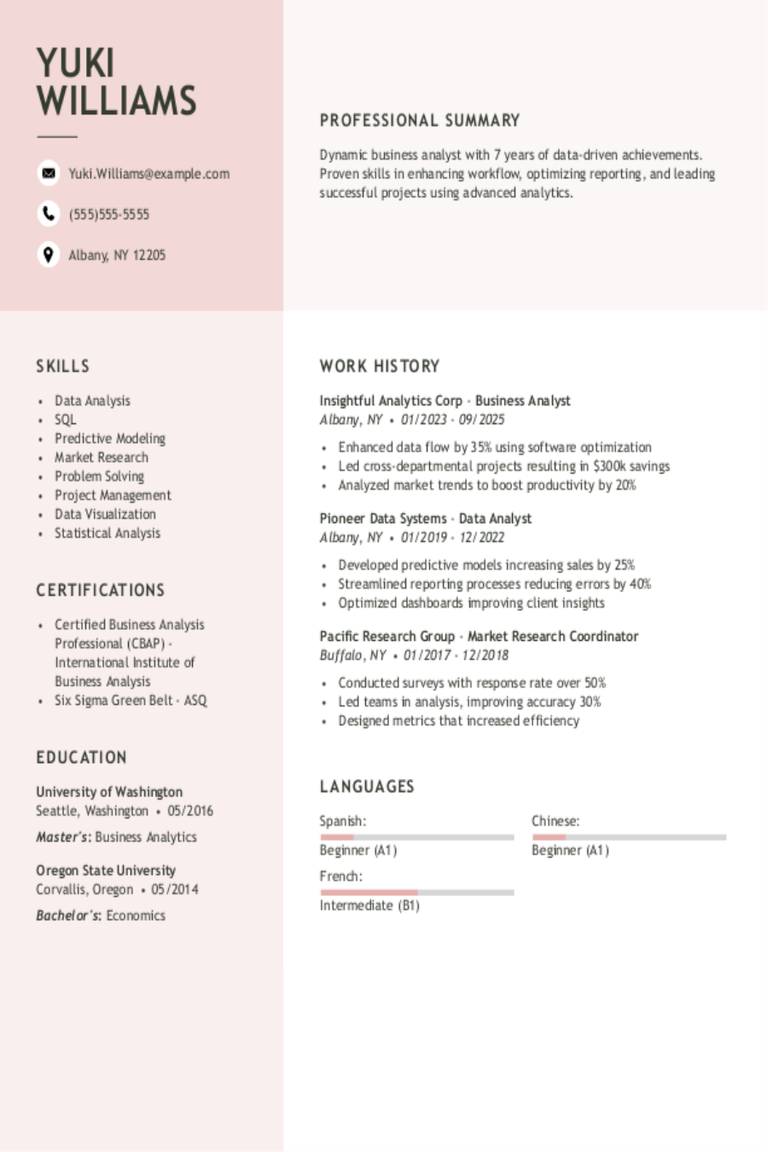
Business Analyst Resume Examples & Templates
Explore business analyst resume examples to see how to showcase your problem-solving, teamwork, and data skills. Browse tips to highlight your experience turning ideas into action and improving processes to
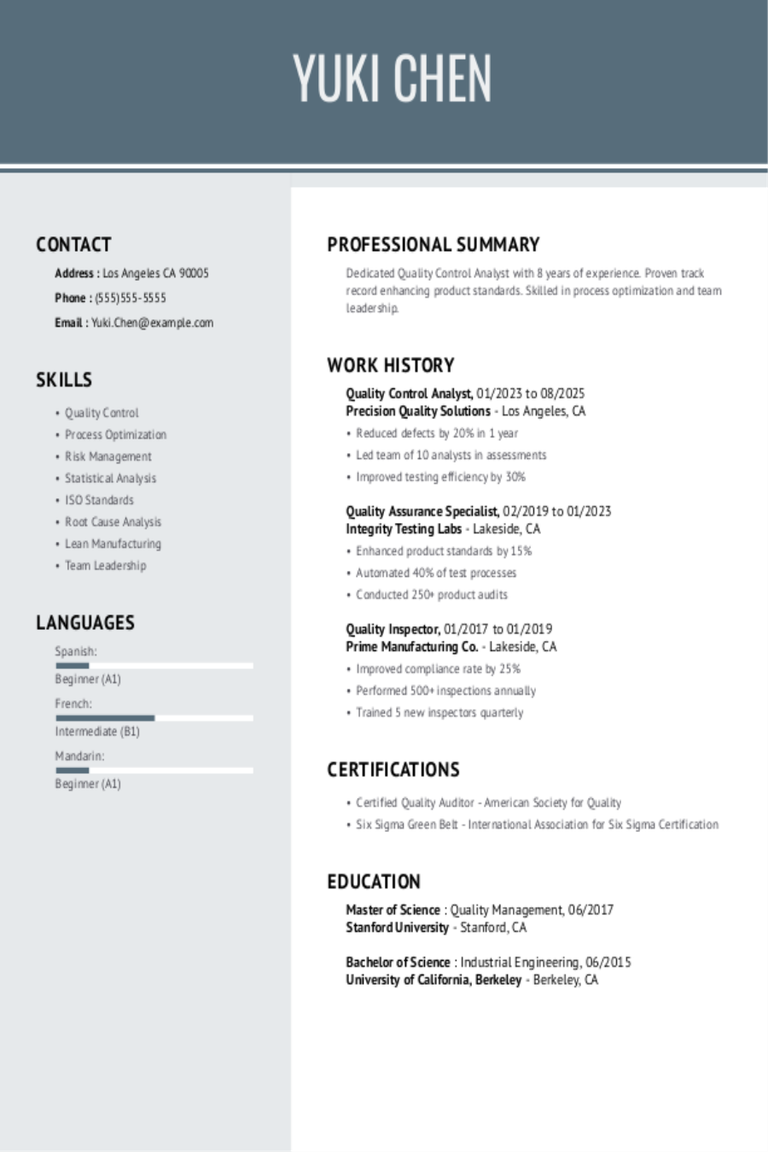
Quality Control Analyst Resume Examples & Templates
Discover how quality control analysts showcase their skills in monitoring products and ensuring standards are met. These resume examples will help you highlight your experience with testing processes and improving
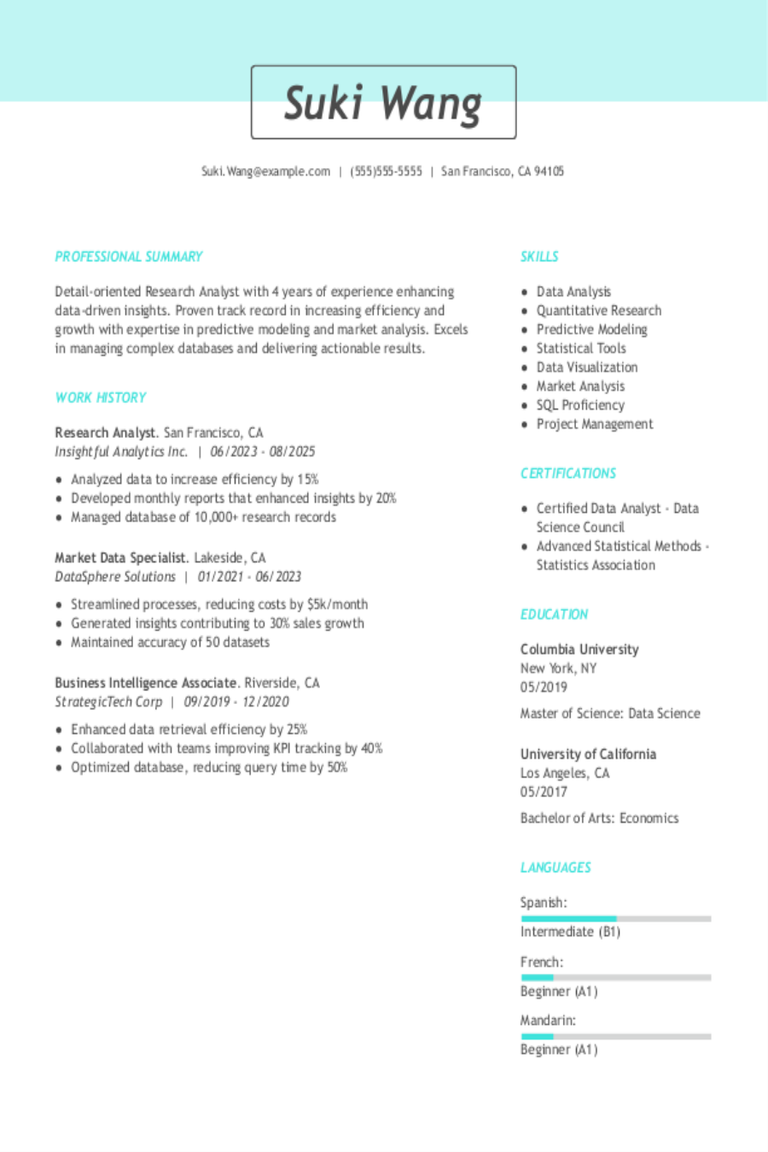
Research Analyst Resume Examples & Templates
Browse research analyst resume examples and learn how to spotlight your skills in data analysis, problem-solving, and research techniques.Build my resumeImport existing resumeCustomize this templateWhy this resume worksQuantifies accomplishments: By
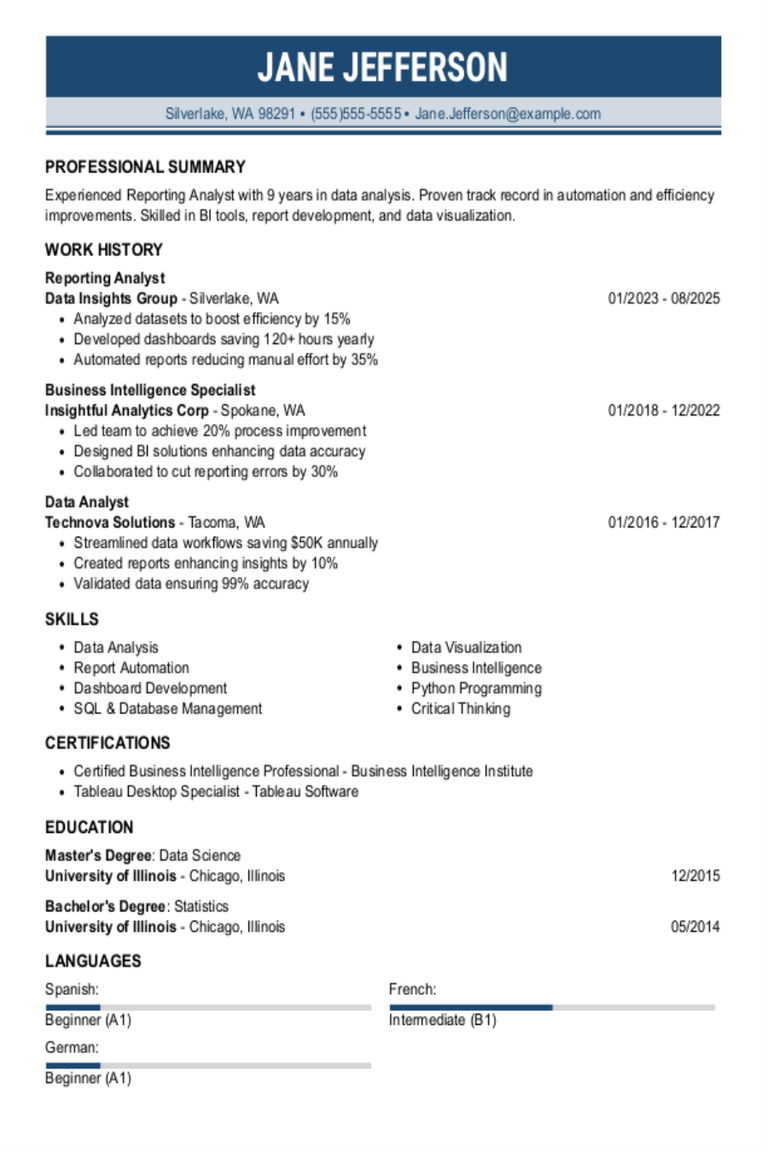
Reporting Analyst Resume Examples & Templates
Discover reporting analyst resume examples and learn to showcase your experience in creating reports and making insights stand out to potential employers.Build my resumeImport existing resumeCustomize this templateWhy this resume
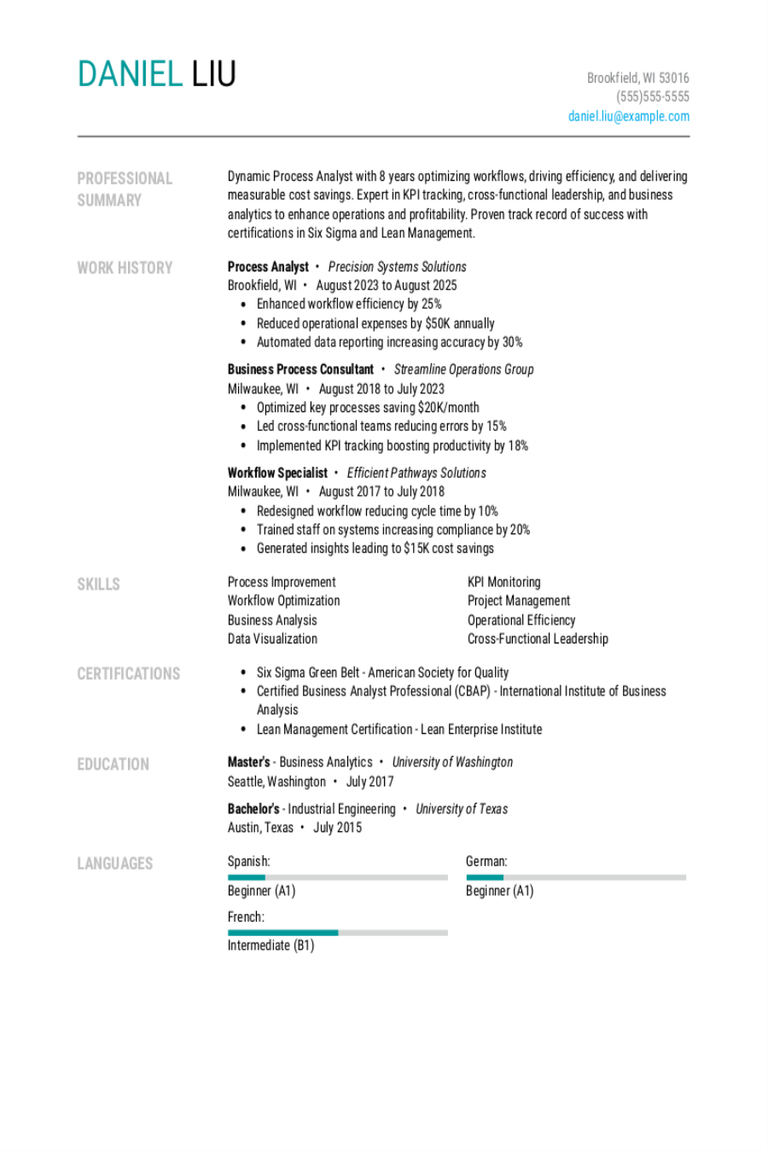
Process Analyst Resume Examples & Templates
Explore process analyst resume examples that show how to spotlight problem-solving and data analysis skills. These tips help you highlight your experience in improving workflows and boosting efficiency.Build my resumeImport
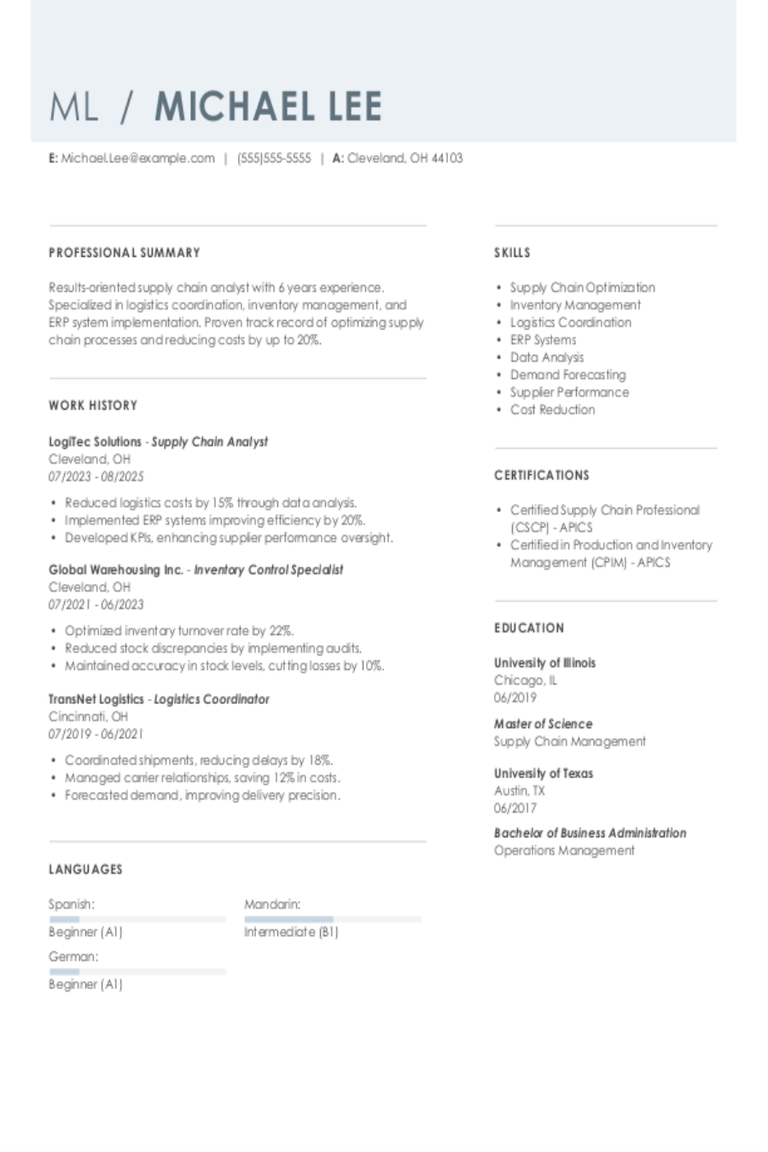
Supply Chain Analyst Resume Examples & Templates
Browse supply chain analyst resume examples to see how to highlight your logistics and planning skills. Learn how to showcase your experience in managing inventory, optimizing processes, and improving supply
